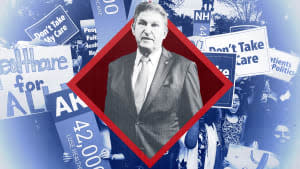ObamaCare set up today's filibuster fight

Democrats are beginning to lose their patience with the filibuster and the handful of recalcitrant members of their own party who refuse to support its abolition. Their election reform bill, a new round of social welfare spending, climate change legislation, perhaps even infrastructure are all stuck due to the Senate's 60-vote threshold for
ending debate.
Having run on an ambitious progressive platform, Democrats only have control of the Senate thanks to Vice President Kamala Harris' tie-breaking vote. Their House majority isn't much larger, but is less of a problem: Sans filibuster, all Democrats have to do is keep their caucus together to pass whatever they want.
Democrats, with a few notable exceptions, would now like to take this process to the "world's greatest deliberative body." But it is their experience with the last time they had a filibuster-proof majority, however briefly, that showed them that lasting liberal legislation could be passed by slim margins on a party-line vote.
ObamaCare initially made it through the Senate when Democrats had 60 votes due to moderate Republican Sen. Arlen Specter switching parties. The party's House majority was roughly as large, but the bill only narrowly passed the lower chamber when nearly 40 Democrats defected to vote against it. Eventually, Democrats had to resort to the
reconciliation process to muscle the legislation over the finish line because liberal icon Ted Kennedy died and was replaced by Republican Scott Brown, putting the filibuster back on the table.
But every major progressive achievement, from the New Deal to the Great Society to ObamaCare, was enacted when Democrats had much bigger congressional majorities than they do today. Social Security, Medicare, and the major civil rights legislation of the 1960s all passed on a bipartisan basis. The thought even among many liberals was that this was necessary to create buy-in for enduring change.
ObamaCare's passage was not bipartisan. In the House, the final margins were close. It cost Democrats their majorities later that year. Yet when the stars aligned for Republicans under Donald Trump in 2017, they could not repeal ObamaCare anymore than the mainstays of the New Deal.
The fact that Republicans ran on repeal for seven years, came close to doing so, and win elections often enough probably suggests the older model works better. Nevertheless, ObamaCare remains the greatest success story of liberals ready to ditch bipartisanship.
